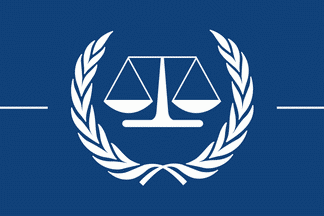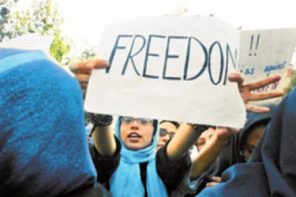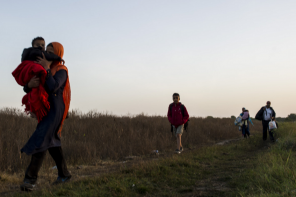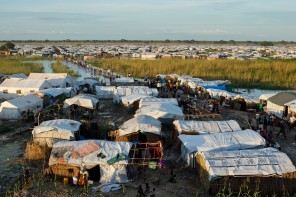After all the reporting trips you’ve read about here, all the stories I’ve done about war and justice and voice and violence, I’m massively persuaded that Rebecca Hamilton is right in her analysis, at Foreign Policy, of the arguments against the ICC blistering around Africa right now:
The court’s all-African line-up is not an ICC problem; it is an African problem, for which there is an African solution. That solution — doing the hard work of strengthening of domestic accountability mechanisms in nations across the continent — is what African leaders should be discussing this weekend. Unfortunately, they will instead rail against, and possibly abandon, the only recourse for justice that African victims of major international crimes currently have.
One reason I’m so persuaded? Because Fatou Bensouda, chief prosecutor of the ICC and a Gambian national, calls the criticism exactly what it is: propaganda.
“What offends me the most when I hear criticisms about this so-called Africa bias,” she said in an interview last year, “is how quick we are to focus on the words and propaganda of a few powerful, influential individuals, and to forget about the millions of anonymous people who suffer from their crimes.”
Hamilton continues:
This week, over 160 international groups and civil society organizations across Africa have sought to give voice to those anonymous people with a letter to African foreign ministers, urging them not to withdraw from the ICC. “As organizations working within Africa, some on behalf of or alongside victims of international crimes, we see every day the importance of ensuring access to justice,” the letter states.
Hamilton draws on her own work interviewing Darfuri refugees when she argues that victims of violence want justice — and they rarely expect to find it at the hands of their perpetrators.
It’s a timely call to dig a little deeper than a flamboyant post-colonial critique of the ICC and ask who we can — and should — protect, and whose voices are still missing from the discussion.





Hi there. Interesting defence of the ICC, or critique of some of the most common critiques of it (claims of imperialism). However both your, Hamilton’s, and Bensouda’s analysis lack a much more structural critique of the so-called “Africa problem” at the ICC. Firstly, yes, some countries in Sub-Saharan Africa suffer from incredibly weak and inefficient- however, the justice systems of several other countries at war both in the North and South leave much to desire, but are not scrutinized in the same way as some African countries. For example, whereas the FARDC is rightfully vilified for the sexual violence many of its soldiers commit with impunity, it’s rarely ever mentioned that the Military of the United States is also currently suffering a lack of ability of willingness to arrest the sexual violence crisis in its own ranks.
Secondly, the weaknesses of these judicial institutions did not happen in a vacuum. In the case of the DRC, you probably know better than I do of how Mobutu Sese Seko destroyed that country’s institutions for his own benefit. And as you know, he was supported enthusiastically by the US. Now, countries in Africa are trying to spur economic growth through natural resource extraction in order to finance the creation of new institutions – but how can you pay for a justice system when you are being economically exploited? A quick example-In 2009 Canada advocated against giving the DRC debt relief because Kabila revoked a contract to a Canadian company that had funded armed groups in the First Congo War. I think both the historical and current political interests of some for weak African institutions should give pause to any Canadian, American, or European before they ask Africans to pick up a mess we helped make.
Finally, no intervention by the outside, whether judicial or otherwise, is ever neutral- nothing exists in a political vacuum. Just because Bensouda is Gambian and Ocampo was terrible with the rhetoric does not give her licence to speak for all Africans, nor does it change the ICCs role in the world system. The ICC as it stands is mainly there to prosecute insurgents (the LRA) or heads of state we either don’t like (Omar Al-bashir, the Gaddafis) or don’t care enough to protect.
The ICC has really yet to take on a case that challenges the powerful in this world, at a global level. Again, your argument is that Africans have weak institutions wrt justice. Well, what of the crimes of the Northern Alliance and Hamid Karzai or NATO forces in Afghanistan, or the right-wing paramilitaries under former Colombian president Alvaro Uribe? Have they shown to be “willing and able” to prosecute their powerful criminals?
It depends on how you define what justice system is weak (Congo) and what is strong (Colombia). But if the ICC is actually a pro-justice and independent institution that could actually hold the powerful to account, there would be many more than just Africans on the inductee list.
Thanks for engagin! Bu it’s worth urging you to read Hamilton’s whole piece. The quotations here, of her and of Bensounda for that matter, don’t qualify as analysis. They’re just bloggy soundbites.
And, though I apologize for repeating a common critique of a common problem, I would be careful about equating, as your last sentence does, “the powerful” with “everywhere but Africa.” I would suspect that the day an Omar al-Bashir walks into the trial chamber of the ICC would seem, to many Darfuris, like a day on which the Court “actually hold[s] the powerful to account,” indeed.